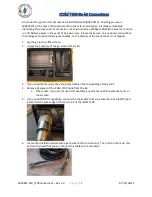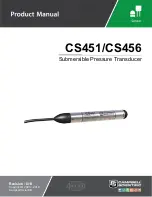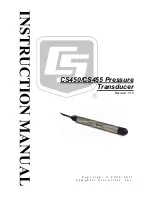
4
TWO POINT CALIBRATION - LEVEL INCREASE
Press Z UP and S UP push buttons at the same time,then
Three calibration procedures are described. Follow the one
release in 1 or 2 seconds.
which fits your application. Note the following definitions used
In very rare cases, a problem of calibration still may persist.
in the calibration procedures, referring to Fig 6.
This is because the values of the minimum and maximum are
not properly distributed. The RESET function may have to be
performed. To RESET the transmitter, simply press Z DW and S
DW push buttons at the same time,then release the two push
buttons after 1 or 2 seconds. Then re-OFFSET the transmitter
as per instructions above. The transmitter will now show a
default value close to 4mA.
When you RESET the transmitter, always perform the OFFSET
after the RESET.
To avoid the possibility of a “dead zone”, L must be at least
DAMPING ADJUST
two (2) inches above the end of the probe for conductive me-
This feature, primarily designed for agitated tanks and factory
dia and four (4) inches above for non-conductive media.
set at 0 sec. (max. CW, neg. direction) via a single turn pot,
sets a time delay on the output signal.
The time delay range is 0-10 sec. approx. For non-agitated
tanks a zero setting is fine. Increase the setting for agitated
tanks by turning the pot CCW. This stabilizes the mA reading,
but adds time delay. When performing calibration, always set
pot to maximum CW direction (minimum time delay).
CALIBRATION PROCEDURE L-H
The ZERO, tank in L (Low) state, MUST always be calibrated
first.
Calibration procedure H-L gives the most accurate results and
is the recommended procedure in all cases.
Turn the DAMP ADJ pot to max CW (neg.) direction.
1. Fill the tank to its H (100 %) level (with probe covered).
2. Depress UP or DW buttons on Z until meter reads 4.00mA.
Do not change the zero controls from now on. If changed,
the material will have to be returned to the H (100%) level.
If a 4.00mA value cannot be reached, then perform
OFFSET AND RESET functions.
3. Fill the tank to the desired H (100%) level.
The loop current may not rise in proportion to the rising
material level in tank. Instead it may rise more rapidly or
more slowly than the material level. The span, S, UP or
DW buttons may be used occasionally to maintain the
loop current approximately proportional to the tank
filling or just below the 20.00 mA reading.
4. After the tank has been emptied to H (100%), depress
SPAN UP or DW buttons as required to obtain a meter
OFFSET AND RESET FUNCTIONS
reading of 20.00 mA. If 20.00 mA reading has been
obtained, the calibration is complete.
OFFSET and RESET functions (or values ) are factory set. They
If a 20.00mA value cannot be reached, then perform OFFSET
may have to be changed by the customer in special cases
AND RESET functions and re-start the
only. Follow the procedures below.
calibration.
There may seem to be a malfunction with the transmitter when
the 4-20mA power loop is activated for the first time. The mA
CALIBRATION PROCEDURE L-H1
reading may be below 4mA or above 20mA and pressing the
Z and S push buttons does not change the output.
The ZERO, tank in L (Low) state, MUST always be calibrated
first.
Push button may have to be depressed for up to a
minute before the value changes.
Turn the DAMP ADJ pot to max CW (neg.) direction.
An OFFSET function may have to be performed. To re-OFF-
1. Fill the tank to its H (100 %) level (with probe covered).
SET the transmitter, fill the level in the tank to cover the probe.
L
The level of material which corresponds to 4.00 mA of
loop current, i.e., the 0% level
L1
a material level higher than L
H1
a material level higher than L1, but less than H
H
The level of material in the vessel which correspond
to 20.00 mA of loop current, i.e., the 100% level
CALIBRATION L- H
When material in tank can be set to L
(0%) and H (100%)
CALIBRATION L - H1
When material in tank can be set to L
(0%) and H1 ( less than 100%)
CALIBRATION L1 - H1
When material in tank can be set to L1
(greater than 0%) and H1 ( less than
100%)
H-100%
H1-Less than 100%
L1-Greater than 0%
L- 0%
Fig. 6
























